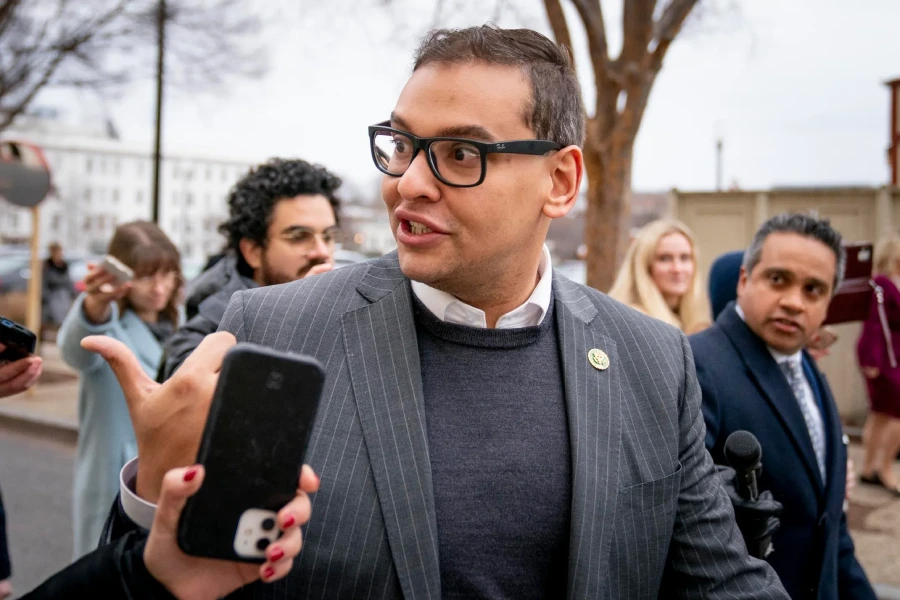Former U.S. Representative George Santos, known for his controversial tenure in Congress, has been sentenced to 87 months (7 years and 3 months) in federal prison for his involvement in a series of criminal activities, including wire fraud, identity theft, and other financial crimes. His conviction marks a significant moment in the political and legal landscape, raising important questions about accountability, justice, and the legal consequences for elected officials who commit criminal acts. This article provides a comprehensive overview of Santos’ case, the legal implications of his sentencing, and an analysis of the broader impact on political ethics and the legal system.
Background of George Santos’ Case
George Santos, a former Republican Representative from New York, rose to prominence in 2022, but his political career was quickly marred by allegations of fraud and deception.
Santos faced a range of charges, including 23 counts related to wire fraud, identity theft, falsification of records, credit card fraud, and other criminal activities. Santos, who had served in Congress for less than a year, was ousted from his position in 2023 after his indictment, even though the criminal proceedings were still ongoing at the time.

The Charges Against George Santos
The charges stemmed from Santos’ deceitful actions during his campaign for Congress. He admitted to stealing the identities of multiple individuals and using fraudulent means to fund his political campaign.
Santos’ actions affected a wide range of victims, including campaign donors, political parties, government agencies, and even his own constituents. His criminal activities included defrauding individuals and businesses, misappropriating campaign funds, and misrepresenting his financial status.
Legal Proceedings and Court Case
Santos’ legal journey culminated in a federal court case where he faced charges related to wire fraud and identity theft.
During the sentencing, U.S. District Court Judge Joanna Seybert expressed frustration with Santos’ apparent lack of remorse, stating, “Where is your remorse? Where do I see it?” She further highlighted that Santos seemed to blame others for his actions, pointing to his failure to take full responsibility for his crimes.
This lack of accountability was central to the court’s decision to impose a lengthy prison sentence.
In August, Santos entered a plea agreement, admitting to the charges of fraud and identity theft. As part of the deal, he agreed to pay nearly $600,000 in penalties. Santos’ legal team had requested a lighter sentence, suggesting that he only serve two years in prison, but the government insisted on the full 87-month sentence, which prosecutors argued was justified given the extent of the crimes and their impact on the victims.
Santos’ Statement and Sentencing
At his sentencing, Santos expressed no significant signs of remorse for his actions. According to reports, he sobbed during the hearing, but Judge Seybert’s questioning emphasized his apparent indifference to the consequences of his fraudulent activities.
Santos’ legal team had previously argued that he should serve a shorter sentence, citing his lack of a criminal record and his history of public service. However, the court ultimately sided with the prosecution’s argument, asserting that his actions were particularly harmful due to his position as an elected official and the breach of public trust involved.
Prosecutors emphasized the impact of Santos’ crimes on his victims, noting that his actions harmed political donors, government institutions, and the very constituents he was meant to serve. U.S. Attorney John Durham stated, “For the defendant, it was judgment day, and for his many victims… it is justice.” The sentencing underscores the principle that elected officials, as public servants, must be held to a higher standard of accountability.

Legal Implications of Santos’ Conviction
The case of George Santos has far-reaching implications for the legal system and political ethics. Elected officials who engage in fraudulent behavior risk severe legal penalties, which can include long prison sentences, financial penalties, and long-term damage to their reputations. In Santos’ case, the conviction highlights the importance of transparency and honesty in political campaigns, as well as the need for strict oversight to prevent the abuse of power.
Wire Fraud and Identity Theft in Political Campaigns
One of the most significant legal principles involved in Santos’ case is the issue of wire fraud.
Wire fraud is a federal crime that involves the use of electronic communications to defraud individuals or institutions. Santos used wire transfers and other electronic methods to misappropriate funds, defraud donors, and engage in illegal activities. The legal ramifications of wire fraud can be severe, with long prison sentences and heavy financial penalties, as evidenced by Santos’ case.
Another important aspect of this case is the crime of identity theft. Santos’ actions involved stealing the identities of multiple individuals, a serious crime that can cause lasting damage to the victims. Identity theft can result in financial harm, damage to credit scores, and emotional distress. The legal system treats identity theft as a serious offense, with severe penalties designed to deter such crimes.

Political and Ethical Considerations
The Santos case has sparked significant debate over political ethics and accountability.
Critics argue that elected officials who commit criminal acts should be held to the highest standards of accountability.
Santos’ actions, including his lies, theft, and fraudulent behavior, have raised concerns about the integrity of the political process and the trust that constituents place in their elected representatives.
The fact that Santos was able to deceive so many people during his campaign and in his personal finances highlights the importance of thorough vetting processes for candidates.
Political parties and voters must remain vigilant in ensuring that candidates are transparent, honest, and accountable for their actions.
Impact on Future Political Careers
Santos’ sentencing could have a lasting impact on his political career. While he may have been ousted from Congress due to his criminal actions, the stigma of his conviction will likely prevent him from running for office again in the future.
His case serves as a cautionary tale for other politicians who may be tempted to engage in fraudulent behavior.
In the broader context, the Santos case could serve as a precedent for future legal cases involving elected officials.
As the legal system continues to hold public figures accountable for their actions, the message will be clear: elected officials who break the law will face the full force of the justice system, regardless of their political affiliations.
Conclusion
George Santos’ sentencing serves as a reminder of the importance of accountability, transparency, and ethical behavior in politics. His case has profound legal, ethical, and political implications, emphasizing the need for strict oversight of public officials and the importance of holding them accountable for their actions. Santos’ conviction and sentencing reinforce the idea that no one, regardless of their position, is above the law. This case serves as a warning to other public officials that criminal behavior will not be tolerated, and that those who break the law will face severe legal consequences.
FAQ
1. What were the charges against George Santos?
George Santos was charged with wire fraud, identity theft, credit card fraud, and falsification of records. He admitted to stealing identities and using fraudulent means to fund his political campaign.
2. How long was George Santos sentenced to prison?
George Santos was sentenced to 87 months (7 years and 3 months) in federal prison for his crimes.
3. What impact did Santos’ conviction have on his political career?
Santos was ousted from Congress in 2023, and his conviction likely ends any future political aspirations. The case serves as a cautionary tale about the consequences of criminal actions for elected officials.
4. What is wire fraud, and how does it relate to Santos’ case?
Wire fraud is a federal crime involving the use of electronic communications to deceive or defraud individuals or organizations. Santos used wire transfers and other electronic methods to misappropriate funds during his campaign.
5. What financial penalties did Santos face?
Santos was required to pay nearly $600,000 in restitution as part of his plea deal.

